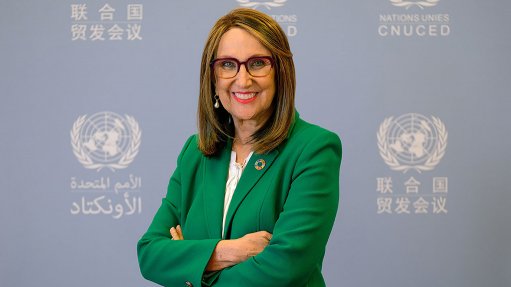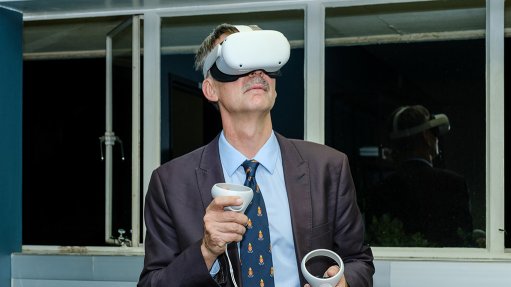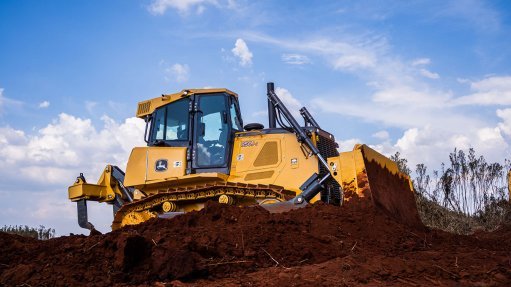Decarbonisation strategies necessary for mining





CHRISTELLE VAN VUUREN Indaba attendees were able to gain insights from the Carbon Trust’s knowledge on climate change strategies and net-zero mining through networking opportunities
REINHARDT ARP The Carbon Trust team discussed topics such as low-carbon technology options, the circular economy and just energy transition interventions
RENATA LAWTON-MISRA The South African mining industry faces consequences, should players in the sector not adopt decarbonisation strategies and achieve net zero by 2050
THE TIME IS NOW The Carbon Trust discussed decarbonisation strategies at this year’s Indaba, highlighting the importance of mining companies embarking on net zero targets
Photo by Adobe
Global climate consultancy the Carbon Trust attended this year’s Investing in African Mining Indaba, and supported a World Bank Climate-Smart Mining Initiative round table event.
Carbon Trust director Christelle van Vuuren, manager Renata Lawton-Misra, and senior analyst Reinhardt Arp attended as company representatives and supported the round table side event on decarbonisation, community resilience, nature-based solutions and sustainable finance.
The team sought to learn from, and network with, mining sector experts to gain greater insights into decarbonisation challenges and opportunities for the African mining sector by discussing topics such as low-carbon technology options, the circular economy and just energy transition interventions.
The event offered the opportunity to engage and validate the team’s research on net-zero mining.
“By gaining these insights, we are better able to understand the needs of the sector and better support mining companies’ net-zero transition in a just and inclusive manner,” says the team.
Attendees, meanwhile, received insight from the Carbon Trust on climate change strategies, net-zero mining and sustainable finance opportunities through networking opportunities.
To tackle decarbonisation in mining, the team says that mining companies can implement different strategies, including developing ambitious climate change strategies with credible and transparent short-, medium- and long-term targets, such as setting and validating scientific emissions-reduction targets, and holding management accountable for the achievement of these targets.
Further, mining companies can collaborate with all mining stakeholders, including the labour force, communities, governments and civil society, in an inclusive and participatory manner to inform decision-making.
“A successful net-zero transition requires multistakeholder collaboration, and consultancies can drive such an endeavour both through and outside of the platform provided by the event,” the team explains.
Local Decarbonisation Plans
Van Vuuren, Arp and Lawton-Misra say that solid plans are in place for decarbonisation initiatives at some South African mining operations.
The Climate Change Bill, passed in February, strengthens the enabling environment for decarbonisation in South Africa. The country has also implemented a carbon tax on greenhouse-gas emissions (GHG) to incentivise mining companies to adopt decarbonisation measures.
Moreover, National Treasury as part of South Africa’s Sustainable Finance Initiative, with support from International Finance Corporation, the Carbon Trust and nonprofit organisation National Business Initiative, recently spearheaded the development of a Green Finance Taxonomy, which aims to make the financial sector more sustainable and drive investments into sustainable activities.
The team says green finance taxonomies are a growing global trend, with South Africa following the likes of the European Union (EU).
Despite South Africa’s carbon tax being among the lowest carbon taxes in the world, carbon pricing policies are nonetheless useful in terms of driving GHG emissions mitigation, and carbon emissions performance does inform investor decision-making.
These kinds of measures influence access to finance for mining companies that do not mitigate their impact on climate change.
The carbon tax will also increase operating costs for mining companies, that should encourage them to invest in cheaper renewable-energy opportunities.
The team cautions that, should the mining sector, and the world more generally, fail to reach net-zero emissions by 2050, mining activities could face increasing biophysical impacts from climate change, including floods, droughts, fires and extreme weather.
The sector will also face increasing transition risks, such as paying higher carbon taxes, as well as worsening international competitiveness and market share, owing to changing consumer preferences and international policies such as the EU’s border carbon tax adjustment.
Hence, the team recommends that South African mining operations follow a “mitigation hierarchy”.
To do so, mining companies should, firstly, measure and disclose their GHG emissions.
Thereafter, companies should reduce their GHG emissions by improving energy efficiency and transitioning to low-carbon energy sources such as wind or solar.
Finally, companies should use credible carbon removal offsets to “neutralise” any residual or hard-to-abate GHG emissions to reach net zero by 2050.
To aid decarbonisation, the Carbon Trust provides expert guidance for accelerating the mining sector’s transition to net-zero emissions through its corporate sustainability and thought leadership service offerings.
“It was encouraging to see environmental and social issues included in a proactive and definable manner alongside economic factors. The Indaba highlighted a strong focus on sustainability from the mining sector, with mining majors and emerging economies reimagining themselves as green champions.
“However, greater ambition and more collaboration is still needed. The steps taken so far – some bold and some hesitant – are only the first required. The key will be in advancing strategies and plans, coupled with timely action,” the team concludes.
Comments
Press Office
Announcements
What's On
Subscribe to improve your user experience...
Option 1 (equivalent of R125 a month):
Receive a weekly copy of Creamer Media's Engineering News & Mining Weekly magazine
(print copy for those in South Africa and e-magazine for those outside of South Africa)
Receive daily email newsletters
Access to full search results
Access archive of magazine back copies
Access to Projects in Progress
Access to ONE Research Report of your choice in PDF format
Option 2 (equivalent of R375 a month):
All benefits from Option 1
PLUS
Access to Creamer Media's Research Channel Africa for ALL Research Reports, in PDF format, on various industrial and mining sectors
including Electricity; Water; Energy Transition; Hydrogen; Roads, Rail and Ports; Coal; Gold; Platinum; Battery Metals; etc.
Already a subscriber?
Forgotten your password?
Receive weekly copy of Creamer Media's Engineering News & Mining Weekly magazine (print copy for those in South Africa and e-magazine for those outside of South Africa)
➕
Recieve daily email newsletters
➕
Access to full search results
➕
Access archive of magazine back copies
➕
Access to Projects in Progress
➕
Access to ONE Research Report of your choice in PDF format
RESEARCH CHANNEL AFRICA
R4500 (equivalent of R375 a month)
SUBSCRIBEAll benefits from Option 1
➕
Access to Creamer Media's Research Channel Africa for ALL Research Reports on various industrial and mining sectors, in PDF format, including on:
Electricity
➕
Water
➕
Energy Transition
➕
Hydrogen
➕
Roads, Rail and Ports
➕
Coal
➕
Gold
➕
Platinum
➕
Battery Metals
➕
etc.
Receive all benefits from Option 1 or Option 2 delivered to numerous people at your company
➕
Multiple User names and Passwords for simultaneous log-ins
➕
Intranet integration access to all in your organisation






















